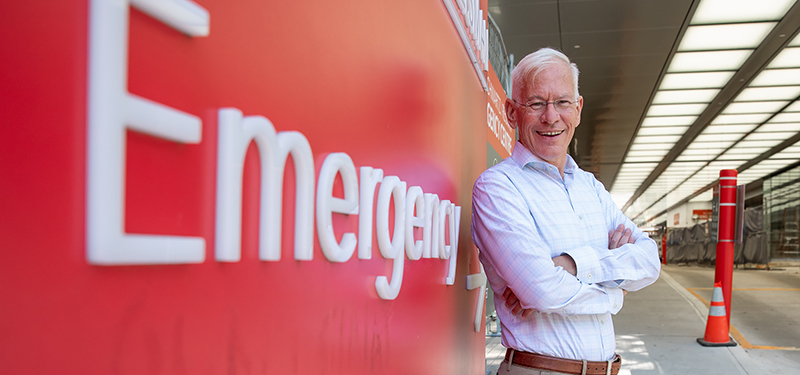
Meet Dr. Don Melady, Emergency Physician at Mount Sinai Hospital and Associate Professor in the Department of Family and Community Medicine. As a Schwartz/Reisman Emergency Medicine Institute (SREMI) scholar, he is a global leader and trailblazer in Geriatric Emergency Care. He is the co-author of a recently published guidebook for ED’s around the world which offers practical ways for emergency care to manage and evolve with society’s growing older population. As he prepares to step away from bedside care to increase focus on academics and advocacy, we had the chance to catch up with Dr. Melady to reflect and also look ahead.
What led to the focus of your practice on the emergency care of older adults?
I’ve always been interested in older people. I grew up in a small town with a big family. At one time I had 32 aunts and uncles over the age of 70. I’ve always felt in tune and comfortable with older people.
I went into emergency medicine as a specialty. For the first decade of my practice, those two interests, emergency medicine and older people, were quite separate. When I came to Mount Sinai 18 years ago, recruited by Dr. Howard Ovens, I declared early on that geriatric care was my interest. I was fortunate that Dr. Ovens saw immediately the link between emergency medicine and older person care.
I found there was a lot of opportunity and encouragement at Mount Sinai to really focus on how we could not just do better but be the best, both clinically and at a system level which involves developing and working with an interdisciplinary team to care for older people.
How has emergency care of older populations shifted during your tenure?
Fast-forward 35 years from when I started my practice, and there are a lot more older people in society, hospitals and in the health care system. That means we really are required to change our paradigm. The care of older people is not amenable to the “quick fix” of single discreet acute problems.
At the Schwartz/Reisman Emergency Centre, I think we have enhanced the interdisciplinary nature of our practice by involving GEM nurses, social workers, physio and occupational therapists in the management of older ED patients. These professionals are available to manage the potentially complex medical, social, cognitive and functional needs or impairments that an older patient in the ED may have.
We have also developed an older person focused volunteer team to work with older patients in emergency as well.
What changes are you most pleased to have witnessed for older patient emergency care throughout your career?
I’m pleased that focusing on the care of older people has really become a standard part of the health care conversation. It’s no longer odd to talk about special care or different or enhanced care for older people. I find that young clinicians are now more aware of older people than we were 25 years ago.
As we in the business like to say: older adults are us. The problems with ageism or discrimination or any kind of prejudice come about from people thinking of “them, not us.” In fact older people – just like every other group – are not them, they’re us. Celebrating what we share is important.
How do you approach a work life balance?
I have a lot of interests outside medicine. I keep active through running. I sing in a couple of choirs and also play piano with a few groups and am still involved with my large family.
What are you currently reading?
I’m reading a book on Mozart called Mozart The Reign of Love, by Jan Swafford.
And, last week, while travelling to an international emergency medicine conference, I read Colm Tóbiín, “Mothers and Sons.”
What changes can we expect for older patients in Mount Sinai’s new Emergency Centre?
It will be wonderful to have a bit more space for all of us to function better – including better conditions for our older patients. There will be more room for the interdisciplinary team. Also, the rooms will be bigger, but specifically for older people who typically have another older person with them. The new ED will have space to welcome that other person too. Simple yet meaningful changes.
